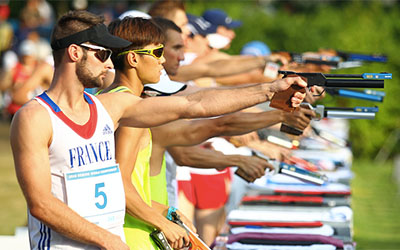Modern Pentathlon Looking to Change Perceptions With New Streamlined Laser-Run Event
September 25, 2015
By Christian Radnedge
The secretary general of the Modern Pentathlon Federation (UIPM) insists their new slimmed down event, the Laser-Run World Championships, can change perceptions of the entire sport and open it up to a new audience.
With the International Olympic Committee looking at how they can revamp the Olympic movement, sports are looking at how they can appeal to new demographics – and that will be seen in Modern Pentathlon on Saturday and Sunday.
Hosted in the southern French city of Perpignan, the Laser-Run World Championships combines the running and shooting elements of modern pentathlon in various races and stages.
It’s the first event of its kind and one that the UIPM hope captures the imagination of a younger audience and encourages participation.
Modern Pentathlon has been accused in the past of being too elitist, with respect to the fact that not everyone has access to or finances available to learn to fence, swim, ride horses in addition to running and shooting disciplines.

But the sport has been in a state of evolution in recent years and now, a streamlined event under the umbrella of Modern Pentathlon could change the modern view of the sport – at least, that is the hope of the UIPM Secretary General Shiny Fang.
“The challenge is to change the perception of the sport for the more traditional countries,” Fang told iSportconnect.
“Normally pentathlon recruited good swimmers as swimming is more difficult to improve, but in the combined event running carries great importance, and with Laser Run, no doubt, you must be a good runner instead of a good swimmer.
“However, this immediately enlarges participation rates as everyone can run.”
Perpignan was chosen as the host of the first Laser-Run World Championships in November 2014 when the UIPM held its Congress in Sofia.
There are, however, no plans to gradually replace Modern Pentathlon in the Olympics with the new event, Fang added.
She said: “Laser Run is a fun, dynamic, competitive and accessible sport, but it cannot replace Modern Pentathlon, which is the symbol of our Olympic roots, and the competitive apex of any sub-sports of UIPM.”

Modern Pentathlon has gone through a number of changes over the past decade, first combining laser shooting and running in the 2008 Olympics in Beijing. There were plans at one stage around 2012 to support a Modern Pentathlon venue for future host cities.
But the sport has had its critics, some even advocated for cutting from the Olympic programme in favour of more extreme sports.
The ancient Greek roots of the sport were meant to be the true test of a warrior’s skills: running, jumping, javelin, discus and wrestling.
The founder of the modern Olympics, Pierre de Coubertin, was so fond of the ancient pentathlon that he designed a new version adopted for the 1912 Games in Stockholm, including five skills that a 19th Century military officer might need behind enemy lines: riding, swimming, fencing, shooting and running. It’s been a part of the Games ever since.
But now the sport is looking at how it can maximise itself outside of the four-year Olympic cycle, and Fang insisted that there was plenty of interest in hosting planned future editions of Laser-Run Championships.
“This [next event] hasn’t been decided yet, and will be decided in Chinese Taipei in November 2015 during the UIPM Executive Board meeting before Congress. Because it is easy to organize for any city or region, there is less pressure on the next host even though it is only one year ahead.

“However, after this first edition, we will launch official bidding procedures for future events, which will be much more advanced to determined the best venues and dates.”
She added: “Yearly World Championships are planned, but we want to see the result of the first one, then decide if we will stage World Tour in all corners of the globe. Already, we have had some interest from event companies eager to discuss various possibilities.”
How will the UIPM see if the event has been a success or not?
“I think the target is to see if participants really enjoy the event and if they want to continue to compete. Ideally we want to see a scenario where it doesn’t matter if athletes win or lose as long as they feel challenged, excited and feel it is a cool sport to be involved in.”
{jcomments on}


